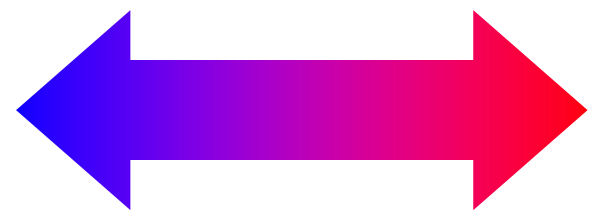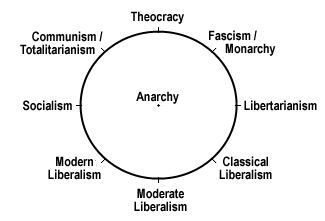Our friend, Lee Wochner, recently attended a town meeting on health care. It was, by his account, less scrum, and consequently more exchange of information, than other such events held recently around the country.
While there, Lee took some photos of the signs some of the attendees were displaying. When asked in his blog post’s comments about it, Lee responded, “Yes, I took the photos. Nobody asked, but here’s what they were all thinking: ‘Why do you hate America?’ Which is kinda what I was wondering about them.”
Having spent much of the last six years outside the United States, I find these individual experiences and the state of politics in general here in America both intriguing and disheartening.
I find it intriguing because I am interested in the evolution of this culture and its societal manifestations, including its political parties.
I find it disheartening for two reasons. First, because I am witnessing the inexorable, terminal polarization of the traditional two party system and I’m not convinced what will evolve to take its place will be any healthier for the country than what we are burdened with today.
Second, I am very disheartened at the very low level of informed discussion and debate in the society as a whole, much less in the public policy arena.
Even given the media’s singular focus on the most bizarre, extreme and non-representative people and opinions associated with any event, the ongoing display of behavior on both ends of the political spectrum of what boils down to “You disagree with me, so you hate America,” does not bode well for public policy, be it at the local city council or U.S. national levels.
It is important to remember that the political spectrum in America is not, as is commonly represented, a conceptual line from left to right:

Remember that the people on the extremes of both the left and the right claim exclusive knowledge as to what constitutes the truth and to what defines “American vales, principles and character.” The extremes of both the left and the right, when left unchecked, have a demonstrated track record of destroying the property, and outright murder, of those who disagree with their political views.
In that sense, the polarized partisans, the zombies who march exclusively to the drum of the ideologues who create and disseminate their political tribe’s views, are not opposite ends of a line, they are a junction point on a circle:

The extreme left and the extreme right can reach out and shake hands with each other in solid agreement that everyone who lacks their exact views does not deserve to live, much less participate in discussing and forming social policy.
The percentage of Americans who belong to the extremes is not large, only 6.6% based on National Opinion Research Center data. Still, that percentage represents 19.8 million people, and that is more than enough to skew their respective parties, distort and dominate the discussion and, when necessary, unleash violence. What is cause for concern, if not alarm, is that the percentage of people who described themselves as either “extreme liberals” or “extreme conservatives” grew a stunning 35% from 1972 to 2004.
When asked, very few people self-identify as a radical-extreme left or right. According to Pew Research, Americans self-identify as 36% moderate, 38% conservative and 21% liberal. Most people, regardless of how much spittle they have just spewed, consider themselves to be fairly moderate, or, at most, simply solidly liberal or conservative.
At one time that might have been true, since in past eras people gained their information from a few relatively centrist sources, such as the major broadcast networks. Today however, people, especially those who are politically active, get most of their information from within their own political tribe, with very little information gleaned from outside a tightly closed environment that severely limits non-conforming messages.
As a consequence, the major parties are becoming more and more extreme in their views, platforms and agendas, as well as becoming increasingly isolated from mainstream America. In a recent Gallup pole 46% of Americans rated the Democrats as too liberal and 43% rated the Republicans as too conservative.
How do you rate yourself: center, left, right, far-left, far-right or ready to pull the trigger? Another way to ask that question is, “Where do you get most of your information?” Take a look at this grid and see where your sources of information line up on the spectrum: http://www.skewz.com/source/compare_sources If most or all of your sources of information are all red or all blue, then it is very unlikely that you have even a remote chance of arriving at an independent and fully informed opinion on social policy.
Information that comes from an ideological point of view is almost always either completely devoid of facts or based on cherry-picked facts, typically exceptions that prove the rule. Information from ideological sources serves only one purpose: To discredit, diminish or destroy the opposing ideology.
Your points of view, like everyone else’s, are shaped by what you put into your head. If what you put into your head is exclusively left or right, then your thoughts, attitudes and opinions are not really your own, they are whatever the thought leaders of those tribes want them to be. Is this really what you want on your tombstone: “Here Lies Another Sheep. I never made a fact-based, independent decision in my entire life.”?
Why should you care if things continue to get less and less informed, more and more ideological and we all continue down this slippery slope of extreme polarization? Because human history demonstrates that this path leads to very bad outcomes.
If we use the traditional illustration of the spectrum of political thought, but include a broader range of values, we yield:

Note that the term “liberal” has undergone a transformation in common use within the relatively modern era of human civilization. Whereas it once defined what we would call modern conservatism, it now defines modern liberalism.
If we map the labels to current political systems, we yield:

All of the political systems in this chart exist in the world today with the exception of “All Over One.” There has never been a true “All Over One” nation state in the modern world. All so-called Communist states have been and remain variations of the “One Over All” or “Few Over The Many” models, ruled by either a single dictator or a small clique.
The “ah ha” moment in this illustration is the realization that democracy is only possible within a very narrow band of the spectrum of political systems that exist now or have ever existed in human society. Democracy exists only within a very narrow window of opportunity. We are living within that very narrow window of opportunity. The question is, “Is the window closing?”
If we join the ends of the line into the circle that is representative of how things manifest themselves in human societies, we get:

The disturbing trend is that in America, the percentage of people self-identifying as moderate has been trending downward for years. Democrats who self-identify as moderates has dropped from 43% to 37% and Republicans who do the same has dropped from 30% to 25%. Even more alarming, among those who claim no party affiliation, the official Independent voters, the percentage of those who self-identify as moderates has dropped from 47% to 45%.
Why should you care if things continue to become more and more partisan, more polarized, more pure-ideology driven in America? Because in human societies, the response to sustained chaos is always the selection of a perceived political solution that promises to re-impose order. Regardless of which political tribe you choose to re-impose order, right or left, you end up in very bad places: totalitarianism or fascism, which are two sides of the same coin.
Given prevailing political views that differed from yours, would you pursue that choice, left or right, to its logical conclusion? Would you join that bandwagon until your opinion, your beliefs prevailed?
There are two rules of life that affect this situation on an individual level. Rule One: A sustained series of small choices add up to big outcomes. What starts small can, when sustained over time and extrapolated over millions of people, lead to major outcomes. Your individual decisions to degrade your integrity and honesty will lead to broad adoption of those choices by those around you. Broad adoption of incremental degradation of honesty and integrity leads to negative social outcomes.
Rule Two: What you think is what you say is what you do. What you choose to think, and what you choose to put into your head to feed that thinking, is what will determine your message and your actions. What you think, and what reinforces that thinking, is what shapes your language and your communications. Your message, what you speak and write, forms the basis, the rationale, for your actions. Your actions form your future and the future of those around you.
Sustained incremental degradation of honesty and integrity, coupled with sustained actions formed by sequestered thought delivers you to a future very different than one based on honesty, integrity and fully informed thoughts, speech and actions.
How do you know what path you are on?
On a personal level, would you repeat an allegation about an individual or a group just because it came from one of your preferred media sources? Would you parrot a label you heard or read on one of your favorite information sources? For instance, would you call a president you disagreed with a fascist or a Marxist? Would you do that just because everyone else in your political tribe was doing so? Is that how you want to live your life, as a thoughtless, blind, deaf and dumb follower?
And on an even more basic level, do you even know what those labels mean?
A Google search for fascism and George W. Bush yields about 1,590,000 hits. A search for fascism and Barack Obama yields about 1,080,000 results. A search for Marxist Barack Obama yields about 1,650,000 results, while a search for Marxist George W. Bush returns about 1,050,000.
These results illustrate that there are plenty of people who are more than willing to label George W. Bush and Barack Obama both a fascist and a Marxist, as well as very broad willingness to parrot a label even if people have no idea what that label means.
A fascist is one who supports and implements fascism, a political philosophy, movement, or regime that exalts nation and often race above the individual and that stands for a centralized autocratic government headed by a dictatorial leader, severe economic and social regimentation, and forcible suppression of opposition.
A Marxist is one supports and implements the political, economic, and social principles and policies advocated by Karl Marx; specifically his theory and practice of socialism including the labor theory of value, dialectical materialism, the class struggle, and dictatorship of the proletariat until the establishment of a classless society.
As you can see, those two labels have almost exactly opposite meanings, to say nothing of their diametrically opposed social and economic implications.
How many times have you read or heard fascist or Marxist on your preferred media sources of political information? How many times have you used those labels when referring to a politician or a person who disagreed with your political opinion? How many times do you think those words were used accurately and fairly by the media you consume, by yourself or by others who share your political views?
While outside this country I spent time in countries that were totalitarian, if not fascist, and others that were socialist, if not Marxist. The reality of the world is very different from what you are told by radio, television and blogs. Based on my experiences, there is no one in the mainstream of American politics who is anywhere close to a fascist or a true Marxist.
However, there are millions of Americans who wrote, spouted and screamed that George W. Bush was an outright fascist and/or a closet Marxist and who today write, spout and scream that Barack Obama is a closet fascist and/or an outright Marxist. In large measure, neither group has the remotest clue what a true fascist or Marxist is, or has ever been in a country that was anywhere near totalitarian, much less fascist, or some form of socialist, much less Marxist.
During the previous administration, the conservative supporters of George W. Bush were outraged by the liberals who called him a fascist. Those very same people on the left who spent years labeling George W. Bush a fascist, are now outraged by those formally outraged conservatives who currently label Barack Obama a Marxist. Both groups are nothing but sanctimonious frauds, intent not on advancing the country, but instead advancing their narrow interests, and ultimately, their exclusive grip on power.
Both of these hypocritical, shallow, hyper-partisan tribes beat paths that lead to the same negative outcome: a country that has no room for anyone who does not espouse their exact views, beliefs and standards.
Remember this illustration:

Democracy exists only in a very narrow band within the full range of potential political systems.
The political system of the United States has only existed for a couple of hundred years. It is an extremely rare form of governance, never before sustained for extended periods in human history. For as long as there have been human societies, for thousands of years, those societies have been governed by other forms of government, almost always totalitarian in nature, and almost always devoid of freedom and liberty in any form or measure.
Because we have grown up with America always being what it is, we have very little to no appreciation how unique it is, how young it is, and, given the context of totalitarian history, how fragile and unlikely to endure it is.
On November 19, 1863 an American president stood before a gathering of his fellow citizens and said, “Four score and seven years ago our fathers brought forth on this continent, a new nation, conceived in Liberty, and dedicated to the proposition that all men are created equal.
“Now we are engaged in a great civil war, testing whether that nation, or any nation so conceived and so dedicated, can long endure.”
Note that phrase, “testing whether that nation, or any nation so conceived and so dedicated, can long endure.” The democracy of the United States is not a given. It is not an entitlement. Nowhere is it written in stone that the democracy of the United States, with its liberties and its freedoms, will endure. It is up to us, the inheritors of the democracy of the United States, to ensure that during our tenure, on our watch, this nation—this democracy—endures.
That same president, Abraham Lincoln, standing on the battlefield at Gettysburg, continued, “… and that government of the people, by the people, for the people, shall not perish from the earth.”
There is only one way to prevent our “government of the people, by the people and for the people” from perishing from this earth, and that is for us all to stop asking “Why do you hate America?” and start asking “Why do you love America?”
*****
This essay is available as a PDF document here: http://www.hackneys.com/docs/whydoyouhateamerica.pdf
Sources:
• Gallup
• Pew Research Center
• National Opinion Research Center
• Encyclopedia Britannica
• Los Angeles Times
• commonsensepoliticalthought.com
• leewochner.com
Very thoughtfully and well written as usual, Doug.
Now, you are much more educated about these kinds of things than me – but are we a republic or a democracy? This came up for discussion a while back.
I thought we were a republic. “…… and to the Republic for which it stands ……”.
Maybe all of it overlaps, not sure.
Republic —
a state or nation in which the supreme power rests in all the citizens entitled to vote (the electorate) and is exercised by representatives elected, directly or indirectly, by them and responsible to them
Democracy —
a government in which the people hold the ruling power either directly or through elected representatives; rule by the ruled
Just food for thought.
Best regards ……
Lauren,
Your observation is correct, the U.S. is a republic, not a direct democracy. I’m not a founding fathers scholar by any means, but as I understand it, they loathed what they’d seen in the brief examples of human societies who attempted direct democracy. Apparently, again as I understand it, they considered each of those attempts a failure that degenerated into chaos.
The layer of representatives between the electorate and the power those elected representatives yield was designed to distribute power; both over time (staggered elections for representatives) and between entities (legislature, executive and judicial).
Unfortunately, our group of elected representatives has, like most human professions and networked relationships, evolved into a caste, a ruling class, that is gated by very high requirements for cash to participate.
Doug
“You disagree with me, so you hate America,”
It is not a matter of hating America. It is a matter of ignoring the original context of the Constitution. If you do not uphold the Constitution of the United States (which most politicians on either side do not) you are an enemy and a traitor to the country, bottom line.
Interesting context about the Constitution. Does that infer we should still have slavery and women should not be voting? The Framers had both of these. Were they right then or was amending the Constitution the right thing to do?
Spending time abroad, and or an alien from a foreign country will not even contemplate the thought of “why I hate America.” But, “why I will not never, ever, live America.”
enrique